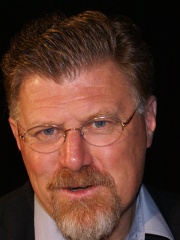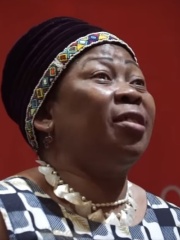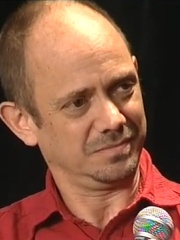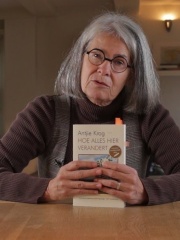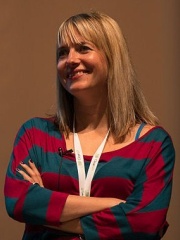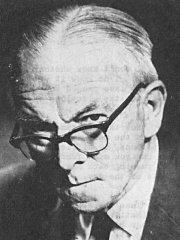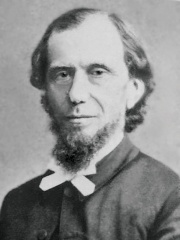
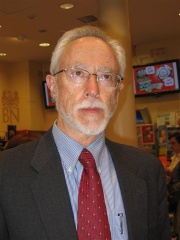
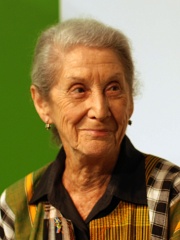
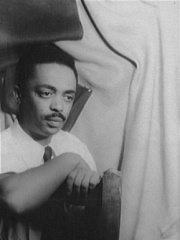
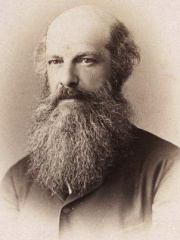
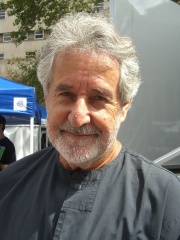

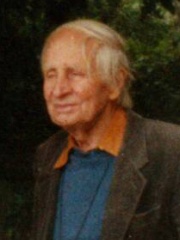
The Most Famous
WRITERS from South Africa
This page contains a list of the greatest South African Writers. The pantheon dataset contains 7,302 Writers, 26 of which were born in South Africa. This makes South Africa the birth place of the 48th most number of Writers behind Iceland, and Slovenia.
Top 10
The following people are considered by Pantheon to be the top 10 most legendary South African Writers of all time. This list of famous South African Writers is sorted by HPI (Historical Popularity Index), a metric that aggregates information on a biography's online popularity. Visit the rankings page to view the entire list of South African Writers.

1. J. R. R. Tolkien (1892 - 1973)
With an HPI of 90.69, J. R. R. Tolkien is the most famous South African Writer. His biography has been translated into 156 different languages on wikipedia.
John Ronald Reuel Tolkien (, 3 January 1892 – 2 September 1973) was an English writer and philologist. He was the author of the high fantasy works The Hobbit (1937) and The Lord of the Rings (1954–55). From 1925 to 1945 Tolkien was the Rawlinson and Bosworth Professor of Anglo-Saxon and a Fellow of Pembroke College, both at the University of Oxford. He then moved within the same university to become the Merton Professor of English Language and Literature and Fellow of Merton College, and held these positions from 1945 until his retirement in 1959. Tolkien was a close friend of C. S. Lewis, a co-member of the Inklings, an informal literary discussion group. He was appointed a Commander of the Order of the British Empire by Queen Elizabeth II on 28 March 1972. After Tolkien's death his son Christopher published a series of works based on his father's extensive notes and unpublished manuscripts, including The Silmarillion. These, together with The Hobbit and The Lord of the Rings, form a connected body of tales, poems, fictional histories, invented languages, and literary essays about a fantasy world called Arda and, within it, Middle-earth. Between 1951 and 1955 Tolkien applied the term legendarium to the larger part of these writings. While many other authors had published works of fantasy before Tolkien, the tremendous success of The Hobbit and The Lord of the Rings ignited a profound interest in the fantasy genre and ultimately precipitated an avalanche of new fantasy books and authors. This has led to his popular identification as the "father" of modern fantasy literature. He is widely regarded as one of the most influential authors of all time.

2. J. M. Coetzee (b. 1940)
With an HPI of 75.60, J. M. Coetzee is the 2nd most famous South African Writer. His biography has been translated into 94 different languages.
John Maxwell Coetzee AC FRSL OMG (born 9 February 1940) is a South African and Australian novelist, essayist, linguist, and translator. The recipient of the 2003 Nobel Prize in Literature, Coetzee is one of the most critically acclaimed and decorated authors in the English language. He has won the Booker Prize (twice), the CNA Literary Award (thrice), the Jerusalem Prize, the Prix Femina étranger, and The Irish Times International Fiction Prize, and holds a number of other awards and honorary doctorates. Coetzee moved to Australia in 2002 and became an Australian citizen in 2006. He lives in Adelaide, South Australia. He is patron of the J. M. Coetzee Centre for Creative Practice at the University of Adelaide. His most recently published book is The Pole and Other Stories (2023).

3. Nadine Gordimer (1923 - 2014)
With an HPI of 75.27, Nadine Gordimer is the 3rd most famous South African Writer. Her biography has been translated into 105 different languages.
Nadine Gordimer (20 November 1923 – 13 July 2014) was a South African writer and political activist. She received the Nobel Prize in Literature in 1991, recognised as a writer "who through her magnificent epic writing has ... been of very great benefit to humanity". Gordimer was one of the most honoured female writers of her generation. She received the Booker Prize for The Conservationist (1974), and the Central News Agency Literary Award for The Conservationist, Burger's Daughter (1979) and July's People (1981). Gordimer's writing dealt with moral and racial issues, particularly apartheid in South Africa. Under that regime, works such as Burger's Daughter were banned. She was active in the anti-apartheid movement, joining the African National Congress during the days when the organisation was banned, and gave Nelson Mandela advice on his famous 1964 defence speech at the trial which led to his conviction for life. She later became active in HIV/AIDS causes.

4. Peter Abrahams (1919 - 2017)
With an HPI of 65.92, Peter Abrahams is the 4th most famous South African Writer. His biography has been translated into 42 different languages.
Peter Henry Abrahams Deras (3 March 1919 – 18 January 2017), commonly known as Peter Abrahams, was a South African-born novelist, journalist and political commentator who in 1956 settled in Jamaica, where he lived for the rest of his life. His death at the age of 97 is considered to have been murder.
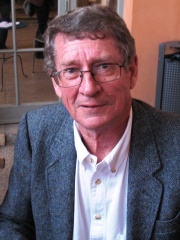
5. André Brink (1935 - 2015)
With an HPI of 64.50, André Brink is the 5th most famous South African Writer. His biography has been translated into 37 different languages.
André Philippus Brink (29 May 1935 – 6 February 2015) was a South African novelist, essayist and poet. He wrote in both Afrikaans and English and taught English at the University of Cape Town. In the 1960s Brink, Ingrid Jonker, Etienne Leroux and Breyten Breytenbach were key figures in the significant Afrikaans dissident intellectual and literary movement known as Die Sestigers ("The Sixty-ers"). These writers sought to expose the Afrikaner people to world literature, to use the Afrikaans language to speak out against the extreme Afrikaner nationalist and white supremacist National Party-controlled government, and also to introduce literary modernism, postmodernist literature, magic realism and other global trends into Afrikaans literature. While André Brink's early novels were especially concerned with his own opposition to apartheid, his later work engaged the new questions of life in South Africa since the end of National Party rule in 1994.

6. Laurence Oliphant (1829 - 1888)
With an HPI of 60.60, Laurence Oliphant is the 6th most famous South African Writer. His biography has been translated into 17 different languages.
Laurence Oliphant (3 August 1829 – 23 December 1888), a Member of Parliament, was a South African-born British author, traveller, diplomat, British intelligence agent, Christian mystic, and Christian Zionist. His best known book in his lifetime was a satirical novel, Piccadilly (1870). More heed has gone since to his plan for Jewish farming communities in the Holy Land, The Land of Gilead. Oliphant was a UK Member of Parliament for Stirling Burghs.

7. Breyten Breytenbach (1939 - 2024)
With an HPI of 60.11, Breyten Breytenbach is the 7th most famous South African Writer. His biography has been translated into 34 different languages.
Breyten Breytenbach (Afrikaans pronunciation: [ˈbrəitən ˈbrəitənbaχ]; 16 September 1939 – 24 November 2024) was a South African writer, poet, and painter. He became internationally well-known as a dissident poet and vocal critic of South Africa under apartheid, and as a political prisoner of the National Party–led South African Government. He was also known as a founding member of the Sestigers, a dissident literary movement, and was one of the most important poets in Afrikaans literature.

8. Ronald Harwood (1934 - 2020)
With an HPI of 59.93, Ronald Harwood is the 8th most famous South African Writer. His biography has been translated into 26 different languages.
Sir Ronald Harwood (né Horwitz; 9 November 1934 – 8 September 2020) was a South African-born British author, playwright, and screenwriter, best known for his plays for the British stage as well as the screenplays for The Dresser (for which he was nominated for an Oscar) and The Pianist, for which he won the 2003 Academy Award for Best Adapted Screenplay. He was nominated for the Best Adapted Screenplay Oscar for The Diving Bell and the Butterfly (2007).

9. Laurens van der Post (1906 - 1996)
With an HPI of 58.50, Laurens van der Post is the 9th most famous South African Writer. His biography has been translated into 20 different languages.
Sir Laurens Jan van der Post, (13 December 1906 – 15 December 1996) was a South African Afrikaner writer, farmer, soldier, educator, journalist, humanitarian, philosopher, explorer and conservationist. He was noted for his interest in Jungianism and the Kalahari Bushmen, his experiences during World War II, as well as his relationships with notable figures such as King Charles III and British Prime Minister Margaret Thatcher. After his death, there was controversy over claims that he had exaggerated many aspects of his life, as well as his sexual abuse and impregnation of a 14-year-old girl.

10. Athol Fugard (1932 - 2025)
With an HPI of 58.22, Athol Fugard is the 10th most famous South African Writer. His biography has been translated into 29 different languages.
Harold Athol Lanigan Fugard ( ATH-əl FYOO-gard; 11 June 1932 – 8 March 2025) was a South African playwright, novelist, actor and director. Widely regarded as South Africa's greatest playwright and acclaimed as "the greatest active playwright in the English-speaking world" by Time magazine in 1985, he published more than thirty plays. He is best known for his political and penetrating plays opposing the system of apartheid, some of which have been adapted to film. His novel Tsotsi was adapted as a film of the same name, which won an Academy Award in 2005. Three plays he wrote, and two plays he co-authored, were nominated for the Tony Award for Best Play. Fugard also served as an adjunct professor of playwriting, acting and directing in the Department of Theatre and Dance at the University of California, San Diego. Fugard received many awards, honours and honorary degrees, including the Order of Ikhamanga in Silver from the government of South Africa in 2005 "for his excellent contribution and achievements in the theatre". He was elected a Fellow of the Royal Society of Literature in 1986. Fugard was honoured in Cape Town with the 2010 opening of the Fugard Theatre in District Six. He received a Tony Award for lifetime achievement in 2011.
People
Pantheon has 26 people classified as South African writers born between 1828 and 1980. Of these 26, 6 (23.08%) of them are still alive today. The most famous living South African writers include J. M. Coetzee, Deon Meyer, and Gcina Mhlophe. The most famous deceased South African writers include J. R. R. Tolkien, Nadine Gordimer, and Peter Abrahams. As of April 2024, 1 new South African writers have been added to Pantheon including Muhsin Hendricks.
Living South African Writers
Go to all RankingsJ. M. Coetzee
1940 - Present
HPI: 75.60
Deon Meyer
1958 - Present
HPI: 55.41
Gcina Mhlophe
1958 - Present
HPI: 55.15
Damon Galgut
1963 - Present
HPI: 49.91
Antjie Krog
1952 - Present
HPI: 49.44
Lauren Beukes
1976 - Present
HPI: 40.53
Deceased South African Writers
Go to all RankingsJ. R. R. Tolkien
1892 - 1973
HPI: 90.69
Nadine Gordimer
1923 - 2014
HPI: 75.27
Peter Abrahams
1919 - 2017
HPI: 65.92
André Brink
1935 - 2015
HPI: 64.50
Laurence Oliphant
1829 - 1888
HPI: 60.60
Breyten Breytenbach
1939 - 2024
HPI: 60.11
Ronald Harwood
1934 - 2020
HPI: 59.93
Laurens van der Post
1906 - 1996
HPI: 58.50
Athol Fugard
1932 - 2025
HPI: 58.22
Alan Paton
1903 - 1988
HPI: 56.69
Elsa Joubert
1922 - 2020
HPI: 54.78
Andrew Murray
1828 - 1917
HPI: 54.68
Newly Added South African Writers (2025)
Go to all RankingsOverlapping Lives
Which Writers were alive at the same time? This visualization shows the lifespans of the 19 most globally memorable Writers since 1700.

